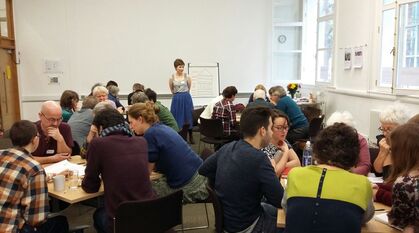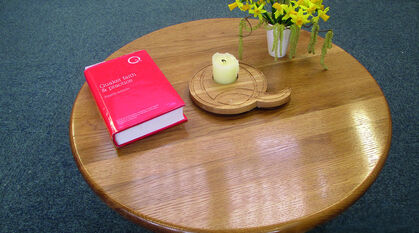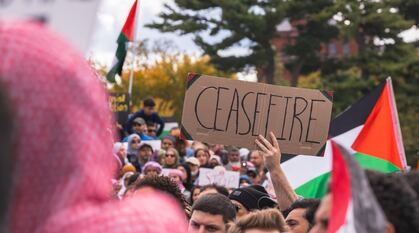Reparations reflections: reading into the silence
Susan Seymour reflects on two passages from Helen Minnis's 2022 Swarthmore Lecture, Perceiving the temperature of the water.

In this series of posts, we share the readings, and reflections, from the opening worship of regular meetings of the Reparations Working Group. This group of British Quakers has been appointed to take forward the commitment minuted by Britain Yearly Meeting in 2022 to consider financial and other reparations for the role of Quakers in the transatlantic chattel slave trade. You can find out more about this decision, and the actions which have flowed from it, on our reparations page.
From the 2022 Swarthmore Lecture by Helen Minnis: Perceiving the temperature of the water
"I know that many of us here just want to know what to do next. We want a call to action. But I can't give you that. It has taken us 500 years, and a myriad of mistakes, to get into this mess so there will have to be a myriad of solutions. As a middle-class British professor, I also spend most of my time bobbing around in the warm baby pool of privilege. The answers that we need are out there in the chillier places, probably blindingly obvious to Black and brown people who are experiencing, on a daily basis, what it means to be on the wrong side of our caste system. If we can find ways of really listening, then we have our best chance of finding out what action to take.
So let's not waste time feeling shame for past wrongs dear Friends. Instead of feeling shame, let's do our very best to swim into unfamiliar waters, to feel the currents and chills in that water, to experience the vivid colours and motion in those chillier places, and to work together with people who are different from us, to create a better planet for us all."
From Part 4, Next steps:
"We need to get ourselves out into uncomfortable places and listen very hard to people who are different from us.
To expand on this just a little, we need to listen especially hard if we are white or have other characteristics that might silence others. It won't help at all if we are simply listening to ourselves within our Meetings or in communities that are relatively homogeneous, culturally and socially. We need to get out of our comfort zones, to encounter people who are different from us in the things that are eternal – and listen. We might not like what they believe, or the way they live their lives, but if we listen, listen, listen, then we might better understand why they believe what they believe and do what they do – and we might learn something useful that makes us want to do some things differently. We certainly need to do something different."
___
I wanted to choose something from Helen Minnis's Swarthmore Lecture as a reminder of who sent us off on this journey and the advice she gave. It speaks to me as a white person, finding it difficult to have more than superficial contact with people of different age groups, levels of education, ethnicities, faiths and political perspectives.
Who do we listen to? Black people do not all speak with one voice in the UK, and we must also hear from Black people in the Caribbean, Africa, and the USA. We also need to listen to our fellow Quakers, who may have different views about the idea of reparations, or other priorities for action, such as peace or climate.
Where am I coming from? I am conscious of being an indirect beneficiary of reparations. My father left Germany as a Jewish refugee in the 1930s and later received a German state pension as if he had worked there all his life. My family history sharpens my awareness that not all racism is directed at black people. There are plenty of other examples of white-on-white racism and of empire or racism oppressing other people of colour (for example in former Yugoslavia where I spent 2 years from 1999 to 2000, and now Ukraine/Russia, Israel/Palestine).
While all Quakers trace roots back to the early Friends in England when the transatlantic chattel slave trade was already developed, how do we make the Reparations Working Group relevant when talking to Friends outside the UK with different, maybe more recent, histories of oppression?
More of my baggage: the Joseph Rowntree Charitable Trust, of which I was a trustee for many years, taught me about racial justice. I took pride in what former trustees and staff had done by funding racial justice groups in the UK and working to bring an end to apartheid in South Africa. It was very painful to hear in recent years that this wasn't enough. Is feeling shame, hurt or defensive, and wanting to protect my former colleagues, part of the process I need to go through?
The questions I would like to ask Quakers are about how to go more deeply into the need for repair:
- What gets in the way of exploring reparations and historical injustice personally and in your Quaker meeting?
- How do you explain the relevance of past injustice when there are so many crises to witness about today?
- How deep should you go? Is there pressure to just apologise, contribute to a few worthy projects and move on?


